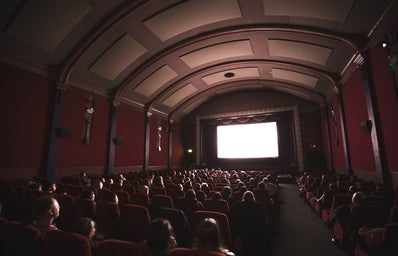Despite its mixed reviews from critics (receiving a 7.4/10 iMDB rating), the film Babylon served as one of my top 10 films to come out in 2022. The film was an explosion of characters, costumes, and emotions as it followed the journey of four prominent stars within Hollywood in the 1920s and 30s. We see Manny Torres (Diego Calva), Nelly LaRoy (Margot Robbie), Jack Conrad (Brad Pitt) and Sidney Palmer (Jovan Adepo) face the trials and tribulations that face them in the turn of the “talkies” and how fame and wealth does not equate to a meaningful life.
Before I get into a more detailed review of the plot, I would like to begin this article with my overarching opinion of the film, as I had no expectations when walking into the cinema, leading me to be pleasantly surprised. I had heard both good and bad things about Babylon before watching it, therefore I did not know in which direction my opinion would sway as many said that some of the mise en scene was “too dazzling” and the run time was too long. While I thought that plot was simplistic, at first glance reminiscent to a story that many of us have seen and heard of before, the execution of it was amazing. Illustrated by Chazelle wonderfully through his use of moving camera shots which created the chaotic yet intimate tone of the film. The comedic timing in the scenes was faultless and there was the perfect balance of joy and humour but also sadness and despair. I feel like historical films set in the 1920s tend to obscure the crudeness and sexuality of this era, solely focusing on the glitz and glamour, but this film conveyed the rawness and bitterness these elements both on and off camera.
The one thing I will say is that some of the dates and situations were historically inaccurate to the time frame but in my opinion, it did not act as a detriment to the film overall. Although the run time of the film was a lengthy 3 hours, personally, I believe it was the right length as it enabled the audience to follow the journeys of the leads to the very end, showing their trials and tribulations. I also felt that the scenes that were explosions of colour, costumes, and people critics argued as being “overwhelming” embodied the confusion and craziness of fame in the time where being a “film star” was a new phenomenon; allowing viewers to navigate the lifestyle and visuals just as the characters were. This film felt personal and very intimate to those who love cinema or just enjoy a film to escape reality.
Furthermore, I enjoyed how the cinematography replicated the different genres that were emerging in film throughout this period, paying homage to that of; romance, action, Western, horror and musicals, which highlighted the love for cinema that the director and writers have and wanted to pay tribute to. The chaos and colour of the opening scenes reflected the excitement of these up-and-coming actors and assistants (especially LaRoy and Torres) when beginning their journeys in the world of film. It is chaotic but so beautiful and the hope and dreams of these characters are represented visually, before that darkness behind the closed doors emerges both metaphorically and literally. As the plot progresses, the tone and lighting get darker and the scenes get quieter, filled with less life and vibrance than before as we see the eventual fall of the Hollywood stars as the new ones rise. As the bleakness of fame is revealed, the suffering and the loneliness behind the silver screen is shown, the film that was once a romance becomes a tragedy. As Babylon unfolds, the audience gets more intimate with the pain behind the actors that they are watching- it is no longer an escape from reality, but a reminder of it.
In this next section, I will be reviewing the performance of the main actors and their characters plot in the film, therefore it will contain spoilers.
The four main aspiring actors and musicians in Hollywood were played fantastically by their respective actors in my opinion. I particularly enjoyed Diego Calva as Manny Torres as I feel like he represented a vulnerability and sensitivity to the world of fame that we do not often see depicted in films about stardom.
Calva had the most complex storyline, interweaving between all other main characters. He started at the bottom as an assistant to parties but through his charisma and personability, is found by Pitt, eventually becoming one of his assistants which leads to his life behind the camera, working on films and eventually becoming “part of something bigger”. The sorrow comes in his life not from hate, but from his love for Nelly, leading him to help her with her debts which gets him into fatal trouble with James McKay (Toby Maguire), forcing Calva to leave LA and never gain his full potential. However, this is bittersweet as he never had a decline in his cinematic career, meaning his legacy will always be that of one of the greats. This is reflected in the closing scenes when he comes back to the cinema in the 1950s and watches a rendition of singing in the rain (an oxymoron in plot and reference that is relevant throughout the film), reflecting on his times of being part of something bigger. He cries as he is sad about what has gone but is ultimately happy about what occurred- he fell in love with cinema, and Nelly was a part of it. The camera then pans out onto the audience, mirroring viewers in the cinema, before slowly panning back onto Manny shedding a single tear at the end of his career, paralleling that of Nelly’s when she started, and he is finally at peace with it all.
Nelly is depicted as being obsessed with fame to the point where she sells herself to the screen as her body. The lifestyle of chaos, drugs and partying is fickle and temporary, when society shifts from the acceptance of such, she is too far gone. Her addiction to drugs and gambling ultimately cost her life and those around her but gets to dance off into the sunset at the end like she always wanted. Nelly is wired to believe that everyone either wants her or to be her and when that is not the case then she is left to fade away with the rest of the silent actors. Robbie played this character extremely well in my opinion as it was seemingly not too far from her rendition of Harley Quinn. Her erratic nature, and pain was reflected in the complexities of both Nelly’s character, and the characters Nelly played, seemingly allowing Robbie to play more parts than one. She is a real talent in this film.
Sidney Palmer has a much sadder story in this film. He only gains recognition in Hollywood for a short period of time. His talents are undeniable, yet his fall is chosen as he is commodified to audiences as his race rather than an individual black performer. Although he chooses to leave the spotlight, arguably because it is an ultimatum between individuality or becoming a pawn in the game of the director, he is the only one whose talents outlived his career. Adepos’ performance was one of my favourites in the film, portraying the pain audiences’ hyper-fixation with talents from minority ethnic backgrounds caused, and how they were used by Hollywood producers as a commodity within this period. Sidney’s performance in his final scene was both heart-breaking and anger inducing to watch but beautifully portrayed by Adepo.
Finally, Brad Pitt performed well as Jack Conrad, an already established actor and big name in the LA scene, who had everything he wanted at the beginning of the film. Albeit a trope almost for Pitt at this point, he performed the stuck up “lady-killer” that was attributed to that of many big names at the time well. I must give credit to his emotional closing scenes and the statements they made about fame. When Conrad falls into irrelevancy, becoming another name and legacy in film, he believes that his time is up. His concluding scene when he is showing his love and respect to arguably the only woman he has truly loved, Lady Fay Zhu (played by Li Jun Li) was played so tenderly and as the sound faded out, we as an audience also realized as he did, that his time was up.
Overall, the Letterbox rating that I gave to this film was a 4/5 stars, as despite its inaccuracy in some respects, I thoroughly enjoyed the performance and the drama of this film. The scenes were very pleasant visually and it really did tug at heart strings one moment then make you cry laugh at the next. I feel like it is a great film to watch with friends or family (or maybe not as there are a good few scenes of nudity) and bond over your love of cinema together. As I said before, this really did feel like Chazelles personal love letter to cinema.
Written by: Eilidh Kirk
Edited by: Michele Ngue-Awane
Sources
https://www.imdb.com/title/tt10640346/fullcredits
https://www.bbc.com/culture/article/20221216-babylon-review-a-cinematic-marvel


